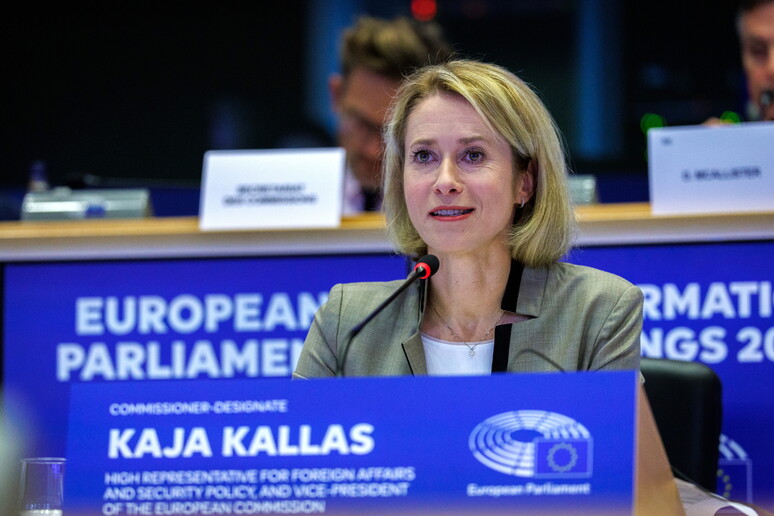The candidate to become the next EU
foreign policy chief, Kaja Kallas, wants a stronger position for
the EU on the global stage. Members of the European Parliament
have questioned the former prime minister of Estonia on a number
of areas, including relations with the United States, the Middle
East, China and Ukraine as part of the confirmation process for
Kallas' expected appointment.
Kaja Kallas, a candidate for the positions of EU High
Representative and Executive Vice-President of the European
Commission, highlighted the war in Ukraine and the Middle East
conflict as her top priorities at a confirmation hearing before
the European Parliament's Committee on Foreign Affairs (AFET) on
Tuesday. She also advocated strengthening European defence and a
close cooperation with the United States.
EU leaders had already nominated the former Estonian prime
minister to be the bloc's next foreign policy chief in June this
year. A hawkish critic of Russia, Kallas has a personal beef
with the Kremlin after Soviet authorities deported her mother to
Siberia in the wake of World War II. More recently, she herself
was put on Russia's wanted list.
The 47-year-old lawyer was first elected to the Estonian
parliament in 2011 for the liberal Reform Party founded by her
father. On her watch, Estonia, which borders Russia, has made a
point of distancing itself from its Soviet past, for example by
removing Soviet-era war monuments. Kallas has pushed for Europe
to build up its defences in the face of Russian aggression and
to supply more weapons to Ukraine.
Viewing the war on Ukraine as an existential threat to her
homeland, Tallinn's "Iron Lady" is expected to maintain a laser
focus on supporting Kyiv. But with the war in Gaza raging and
challenges mounting around the globe, she will have to prove
quickly that she is not a one-trick pony. What's her vision of
the EU's foreign policy for the next five years?
"Our neighbours' problems today are our problems tomorrow"
"This will not be an easy five years," Kallas told members of
the European Parliament's foreign affairs committee on Tuesday.
As she explained, wars are raging in the Union's vicinity and
actors such as Russia, China and Iran are trying to change the
world order.
Ukraine's victory is "our priority", Kallas said. The European
Union must back Ukraine "for as long as it takes" in its fight
to repel Russia's invasion, she added. "The situation on the
battlefield is very difficult. And that's why we must keep on
working every day," the Estonian politician told EU lawmakers in
Brussels. "Today, tomorrow and for as long as it takes and with
as much military, financial and humanitarian aid as needed."
In her opening speech, Kallas did not only talk about Ukraine,
but also mentioned the war in the Middle East. Attacking
civilians or civilian infrastructure is not allowed under
humanitarian law, Kallas pointed out. She stressed the need for
an immediate ceasefire and the release of all hostages, but also
the need to focus on humanitarian support and be committed to a
two-state solution. This is a good basis for diplomatic efforts
to end the conflict, she argued.
"Our neighbours' problems today are our problems tomorrow," she
warned.
"I see actors such as Russia, China, North Korea, Iran aiming to
change the rules-based international order," she said, adding
that the EU must be ready to respond to all threats together
with its allies and partners.
Dependence on China and cooperation with the US
Kallas pointed out that China has changed in recent years. "Our
dependencies towards China in the key sectors are our
vulnerability," she acknowledged. She also advocated that China
should pay the price for its support for Russia in the war in
Ukraine.
"Without China's support to Russia, Russia would not be able to
continue its war with the same force," Kallas said. "Russia,
Iran, North Korea produce more equipment and ammunition than the
whole euroatlantic community," she said. According to Kallas,
the European Union must invest more in defence and clearly
confront threats.
"Everybody wants peace, but there is a difference between peace
and peace. We want a sustainable peace, because if we just give
in to the aggressor and say that 'OK, take what you want', then
all the aggressors or would-be aggressors all across the world
will get the note that it pays off," Kallas responded to a
question posed by a far-right German MEP Alexander Sell from the
Europe of Sovereign Nations (ESN) fraction.
She also announced that she would contact the administration of
US President-elect Donald Trump before he takes office. Kallas
highlighted that the United States remains the EU's most
important ally and the bloc will continue to work closely with
them.
EU enlargement: clear results by 2029
Kallas emphasised that the EU's efforts to enlarge the European
Union must deliver clear results by 2029, when the mandate
expires. She described the increase in membership as a
geostrategic investment.
Speaking about EU enlargement, Kallas underlined the importance
of the Western Balkans as a European region. She stressed two
important tracks: a path to EU enlargement and the dialogue
between Belgrade and Pristina. "I think we really need to have
success stories in five years in terms of enlargement. Because
it's not only for the prosperity of the region but also to give
hope to the region."
To deliver on enlargement, Kallas pledged to work closely with
the next European Commissioner for the portfolio. The Slovenian
Marta Kos, Commissioner-designate for the Enlargement post, was
already heard by members of the European Parliament's foreign
affairs committee last Thursday.
Kallas also stressed that freedom of movement is one of the
Union's most important achievements, and that the external
border should be strengthened. "We cannot be both borderless
inside and out."
(continues)
ALL RIGHTS RESERVED © Copyright ANSA











